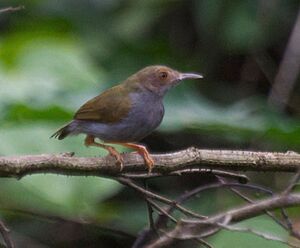Olive-green camaroptera facts for kids
Quick facts for kids Olive-green camaroptera |
|
|---|---|
 |
|
| In the Nsuta Forest, Ghana | |
| Conservation status | |
| Scientific classification | |
| Genus: |
Camaroptera
|
| Species: |
chloronota
|
The olive-green camaroptera (Camaroptera chloronota) is a small, colorful bird. It belongs to the Cisticolidae family, which includes many types of warblers. This bird is known for its pretty olive-green feathers.
Contents
About the Olive-Green Camaroptera
A German bird expert named Anton Reichenow first described the olive-green camaroptera in 1895. He gave it the scientific name Camaroptera chloronota. This name helps scientists around the world know exactly which bird they are talking about.
What Does Its Name Mean?
The second part of its scientific name, chloronota, tells us something special about the bird. It comes from ancient Greek words. Khlōros means "green," and -nōtos means "-backed." So, its name basically means "green-backed camaroptera."
Different Types of Olive-Green Camaroptera
There are five different types, or subspecies, of the olive-green camaroptera. They look very similar but live in slightly different areas:
- C. c. kelsalli (found from Senegal to Ghana)
- C. c. chloronota (found from Togo to Cameroon, Gabon, and Congo)
- C. c. granti (found on Bioko Island)
- C. c. kamitugaensis (found in eastern DR Congo)
- C. c. toroensis (found from the Central African Republic to parts of Kenya and Tanzania)
Where Does It Live?
The olive-green camaroptera lives in many countries in Africa. You can find it in places like Benin, Cameroon, Central African Republic, Republic of the Congo, Democratic Republic of the Congo, Ivory Coast, Equatorial Guinea, Gabon, Gambia, Ghana, Guinea, Kenya, Liberia, Mali, Nigeria, Rwanda, Senegal, Sierra Leone, South Sudan, Tanzania, Togo, and Uganda.
Its Favorite Homes
This bird loves to live in warm, wet places. Its natural habitats include:
- Subtropical or tropical moist lowland forests
- Subtropical or tropical moist montane forests (forests on mountains)
- Subtropical or tropical moist shrubland (areas with lots of bushes)
The olive-green camaroptera often flies in groups of 50 to 100 birds. It usually stays in its home region and does not fly long distances to other continents.


